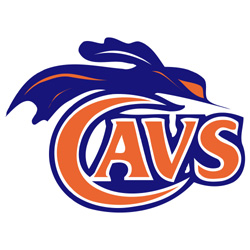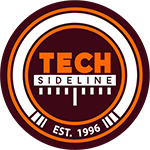|
Info Center |
|
TSL Roster Card |
|
Charlottesville Weather |
|
Scott Stadium Seating Chart |
|
Parking Info |
|
2011 VT Roster |
|
Virginia Links
|
|
HokieSports.com Links |
|
Game Notes (PDF) |
|
Radio Stations |
|
Live Stats (home games) |
- Date: Saturday, November 26th, 2011
- Time: 3:30
- TV: ABC or ESPN2
 It has been a while since the VT-UVA game has meant something. Back in 2007,
It has been a while since the VT-UVA game has meant something. Back in 2007,
the teams faced off in Charlottesville for the Coastal Division crown, and the
Hokies walked out of Scott Stadium with a 33-21 win. The Hoos have made huge
strides in Mike London’s second season in Charlottesville, and you can bet that
both teams will be mentally and physically ready for this game.
This is a battle of the two hottest teams in the ACC. The Hokies have run off
six straight wins after losing to Clemson on October 1. Virginia lost to NC
State 28-14 in mid-October, but they’ve since won four consecutive contests,
including two games in the state of Florida against Miami and Florida State.
Ever since Mike London pulled the plug on his quarterback rotation and handed
the reins entirely to Michael Rocco, the Hoos haven’t lost.
Logan Thomas vs. Michael Rocco
In a special section of the game preview this week, we’re going to focus on a
very important matchup in this weekend’s game: Logan Thomas vs. Michael Rocco.
Each quarterback has his own story. Thomas is a first year starter who was
very raw when the season began, but started to get things cranked up after the
Hokies lost to Clemson. Thomas has been nearly unstoppable since that game,
putting up huge numbers.
Logan Thomas, Last 6 Games |
|||||
Opp. |
Comp. |
Att. |
Yards |
TD |
INT |
| Miami | 23 | 25 | 310 | 3 | 0 |
| Wake | 17 | 32 | 280 | 2 | 0 |
| BC | 22 | 36 | 268 | 1 | 0 |
| Duke | 17 | 28 | 190 | 1 | 2 |
| GT | 7 | 13 | 209 | 3 | 0 |
| UNC | 19 | 32 | 195 | 2 | 0 |
Totals |
105 |
166 |
1452 |
12 |
2 |
158.17 rating |
|||||
The passing game has been a big part of Virginia Tech’s success. The raw
talent of Logan Thomas, and the fact that he’s a very quick study, have made the
Tech passing game very difficult to handle for opponents. With 257 yards on the
ground and eight rushing touchdowns in those six games, he’s also a load on the
ground.
Six games is 50% of a college football season, and if Thomas had been playing
at this pace to start the year, he’s be on pace for a total of 40 touchdowns in
the regular season alone, not to mention close to 3,000 passing yards and
minimal turnovers. Those are Heisman numbers right there.
Mike Rocco overcame different circumstances. He was part of a quarterback
rotation with David Watford earlier in the season, but after Watford threw three
interceptions against NC State, Mike London elected to go with the sophomore
Rocco for the rest of the season. The results have been terrific for UVA, as the
Hoos are 4-0 with road wins at Miami and Florida State. Their quarterback has
put up impressive numbers in those games.
Mike Rocco, Last 4 Games |
|||||
Opp. |
Comp. |
Att. |
Yards |
TD |
INT |
| Miami | 11 | 20 | 226 | 2 | 0 |
| Maryland | 23 | 36 | 307 | 2 | 1 |
| Duke | 15 | 29 | 192 | 2 | 0 |
| FSU | 22 | 31 | 238 | 1 | 0 |
Totals |
71 |
116 |
963 |
7 |
1 |
149.13 rating |
|||||
Rocco has played mistake-free football and has also come up with big throws
in critical games for his team. He is a much improved player now that he knows
the starting job is 100% in his hands.
I think Logan Thomas is the more physically gifted player, and I think he’s
got more talent surrounding him on the offensive side of the ball. However,
Rocco will be at home, and he’ll be protected by a very good offensive line. I
think whoever has the better game between these two guys will walk out of Scott
Stadium with the Commonwealth Cup.
UVA Offense Relies on Offensive Line, Running Backs
Virginia likes to line up in power formations and run the football with three
quality tailbacks. Once they get the running game established, they look to hit
wide receivers Kris Burd (6-1, 200, Sr.), Tim Smith (6-0, 185, So.) and Darius
Jennings (5-11, 165, Fr.) down the field.
The Hoos are able to run the football because they have a talented and
experienced offensive line.
The UVA Offensive Line |
|||||
Pos. |
Name |
Ht. |
Wt. |
Yr. |
Starts |
| LT | Oday Aboushi | 6-6 | 310 | Jr. | 23 |
| LG | Austin Pasztor | 6-7 | 305 | Sr. | 43 |
| C | Anthony Mihota | 6-4 | 285 | r-Sr. | 23 |
| RG | Luke Bowanko | 6-6 | 295 | r-So. | 11 |
| RT | Morgan Moses | 6-6 | 335 | So. | 18 |
Those guys have been on the field for a lot of snaps, and from left to the
right the line has great size. Morgan Moses is the most physically gifted, but
center Anthony Mihota is one of the most underrated linemen in the ACC.
UVA tight ends Colter Phillips (6-6, 245, Jr.), Paul Freedman (6-6, 260, Jr.)
and Jeremiah Mathis (6-3, 245, So.) have pretty good size as well, though the
Hoos don’t have a great receiving threat at this position as they’ve had at
times in the past. Two experienced fullbacks – Max Milien (6-0, 220, Sr.) and
Terence Fells-Danzer (6-1, 240, Sr.) also help UVA in the running game, and
Milien is a productive player with 11 receptions on the year. He is a former
tailback, so he is effective with the ball in his hands.
 Virginia has three very productive tailbacks – Perry Jones (5-8, 185, Jr.),
Virginia has three very productive tailbacks – Perry Jones (5-8, 185, Jr.),
Kevin Parks (5-8, 195, r-Fr.) and Clifton Richardson (6-0, 215, Fr.). Jones
leads the team with 870 yards on 170 carries, a 5.1 yards per carry average. He
has five rushing touchdowns on the year. Parks has been productive, with 134
carries for 644 yards and eight touchdowns, while Richardson has 63 carries for
328 yards and two touchdowns.
Those three players have combined for 1,842 yards on 367 carries this season.
They are the workhorses of the UVA offense. Jones and Parks are similar runners,
while Richardson is bigger, and at times seems to play even bigger than his
listed weight of 215. He has just eight yards worth of lost yardage on the
season, and he’s the type who always goes forward.
By far the most productive wide receiver of this group is Kris Burd, who has
53 catches for 710 yards and a touchdown this season. Tailback Perry Jones has
41 catches, which shows how important he is to the offense. Virginia can move
him around in a variety of ways. Tim Smith is a quality receiver with 31
receptions for 523 yards and three touchdowns.
Beyond Burd and Smith, UVA has unproven true freshmen. Darius Jennings has
shown flashes with 16 catches for 203 yards and a touchdown, but Dominique
Terrell (5-11, 170, Fr.) has just six catches despite being #2 on the depth
chart. In hindsight, a redshirt might have been more beneficial for Terrell in
the long run.
The absolute key to this game is stopping the run. Kris Burd and Tim Smith
are good players, but I trust the Virginia Tech cornerbacks in coverage with
them down the field. I think the Hokies will get Eddie Whitley and Antone Exum
involved in the running game quite a bit.
In fact, the UVA offense is pretty similar to the UNC offense across the
board. Mike Rocco and Bryn Renner are similar players, both teams have
productive tailbacks with big offensive lines, and after their top two receivers
there is a big dropoff. Both offenses use a lot of power formations, with
multiple tight ends. I would expect Bud Foster to use a similar game plan to
what he used against North Carolina last Thursday.
Finally, here’s a look at the numbers the UVA offense has put up against ACC
competition this year, along with their conference rank in each category.
The UVA Offense |
||
Category |
Stat |
ACC Rank |
| Rushing | 176.9 ypg | 4 |
| Passing | 222.4 ypg | 8 |
| Total | 399.3 ypg | 3 |
| Scoring | 22.7 ppg | 8 |
| Pass Eff. | 128 | 7 |
| Third Downs | 40.2% | 5 |
| Sacks Allowed | 6 | 1 |
Average |
5.14 |
|
Virginia is one of the league’s better running teams, but they don’t score a
lot of points. As a comparison, Tech’s offense ranks an average of 3.57 against
ACC competition. Tech and UVA have played almost identical ACC schedules this
season.
Size and Experience Make UVA Defense the Polar Opposite of Tech’s Defense
We’ve talked all year about the lack of size and experience on the Virginia
Tech defense. Against North Carolina, the Hokies started five sophomores and two
freshmen in the front seven. Statistically the Tech defense is better than the
UVA defense, but the Hoos have some impressive players in their stop unit.
The UVA Defense |
||
Category |
Stat |
ACC Rank |
| Rushing | 142.4 ypg | 6 |
| Passing | 221.9 ypg | 7 |
| Total | 364.3 ypg | 4 |
| Scoring | 20.7 | 2 |
| Pass Eff. Def. | 127.7 | 6 |
| Third Downs | 30.3% | 1 |
| Sacks | 8 | 8 |
Average |
4.86 |
|
Against almost the same competition, Virginia Tech’s average defensive rank
in those categories is an even 3.0, and the Hokies don’t rank lower than fourth
in any category.
The Hoos are middle of the pack against the run and the pass, but they stop
opponents on third down and keep them out of the endzone. The Tech offense has
converted over 46% of their third downs in ACC play (59.4% against GT and UNC),
and it’s vital that they have another good day on third down this Saturday.
 UVA has a defensive front that is big at defensive end and somewhat light at
UVA has a defensive front that is big at defensive end and somewhat light at
tackle. No disrespect to Chase Minnifield, but I believe that defensive end Cam
Johnson (6-4, 270, Sr.) is UVA’s best defensive player. The senior has 10.5
tackles for loss and four sacks on the season. He has just 25 total tackles,
which means that over 40% of his tackles have come in the backfield. Johnson is
big and strong, and he would be a tough matchup against the left side of Tech’s
offensive line, particularly Nick Becton.
Defensive tackle Matt Conrath (6-7, 280, Sr.) was recruited to UVA to play
defensive end in the 3-4, but he is now a defensive tackle in their 4-3 scheme.
Conrath is their best inside player, with 61 tackles, 10 tackles for loss and
two sacks in 2011. He is third on the team in overall tackles, which is very
impressive for a defensive tackle.
Defensive end Jake Snyder (6-4, 275, So.) and defensive tackle Nick Jenkins
(6-3, 275, Sr.) round out the starting lineup on the defensive line. They are
strong at the point of attack, but haven’t proven to be playmakers for the UVA
defense. One backup to keep an eye on is defensive tackle Will Hill (6-4, 280,
Jr.), who has 5.5 tackles for loss this year.
The Hoos took it on the chin when backup defensive end Bill Schautz went down
with a leg injury against Florida State. He was lost for the season. Schautz was
a very productive player for the Hoos despite playing in a reserve role.
Virginia has an active group of linebackers led by middle linebacker Steve
Greer (6-2, 225, Jr.). Greer leads the team with 94 tackles this season,
including six tackles for loss and two sacks. He’s also broken up four passes,
and overall he has been UVA’s most consistent linebacker this season. He’s
joined by weakside backer LaRoy Reynolds, who is UVA’s top playmaking linebacker
with seven tackles for loss and 74 tackles total.
At strongside linebacker, the Hoos rotate Ausar Walcott (6-4, 240, Jr.) and
Aaron Taliaferro (6-2, 230, Sr.). Between those two players, UVA gets good
production. The Hoos will run blitz a lot, and only 18 of their 74 tackles for
loss this season have been sacks. They are making a lot of tackles for loss
against the run. As a comparison, 33 of Virginia Tech’s 70 tackles for loss have
been sacks. UNC blitzed the Hokies more than expected last Thursday night, and
overall the Tar Heels have similar size up front, so Virginia Tech should be
pretty well prepared for the UVA front seven.
Virginia’s secondary is naturally aggressive, led by cornerback Chase
Minnifield (6-0, 185, Sr.). Minnifield is big and physical, and he’s good in man
coverage. Jarrett Boykin presents an interesting matchup with Minnifield because
of his size, strength and body control.
The starting safeties are Corey Mosley (5-10, 200, Sr.) and Rodney McLeod
(5-11, 180, Sr.). These guys are also naturally aggressive and they like to play
downhill. If Virginia Tech can establish themselves as a running threat in this
game, then Mosley and McLeod will be susceptible to playaction passes.
Look for the Hokies to try and find a way to isolate true freshman cornerback
Demetrious Nicholson (5-11, 165, Fr.) against experienced receivers like Jarrett
Boykin, Danny Coale, Marcus Davis and D.J. Coles. All of them have a tremendous
experience advantage over Nicholson, while Boykin, Davis and Coles have a huge
size advantage. Nicholson has been beaten deep a lot this year, and if the UVA
coaching staff plays him deep off the line of scrimmage, that could open up the
wide receivers screens that the Hokies are so good at using.
Special Teams Not so Special for Either Team
Both of these teams have had their share of problems on special teams so far
this year, and it’s almost amazing that the top two teams in the Coastal
Division have been so bad in the kicking game.
Special Teams Comparison |
||
Category |
UVA |
VT |
| KO Return | 64 | 103 |
| KO Return Def. | 59 | 71 |
| Punt Return | 85 | 37 |
| Punt Return Def. | 71 | 20 |
| Net Punting | 88 | 118 |
Average |
73.4 |
69.8 |
In the average rankings, Virginia Tech is slightly better on special teams
than UVA, and I don’t know if we’ve been able to say that about any other
opponent all season.
Virginia relies on a number of freshmen in the return game. Dominique Terrell
(5-11, 170, Fr.) handles the punts, and of his 14 returns on the season, he has
averaged only 4.4 yards. Darius Jennings (5-11, 165, Fr.) and Khalek Sheperd
(5-8, 185, r-Fr.) are the kickoff returners. They have done a solid job, though
neither player has been able to bust a big play this season.
Robert Randolph (5-10, 170, Sr.) is 15-of-21 on his field goal attempts this
season, with a long of 48 yards. He is 4-of-6 beyond 40 yards, which is a very
good mark. However, he’s just 3-of-6 on kicks between 30 and 39 yards.
Jimmy Howell (6-6, 240, Sr.) punts for the Hoos and he is averaging 39.4
yards per punt. One blocked punt cuts into his average a bit. Howell is also
capable of rugby style punting, so expect to see a little bit of that against
the Hokies on Saturday.
Fans of both teams are probably heading into this game thinking the same
thing: “Man, I really hope our special teams don’t lose this game for
us.”
Final Thoughts
This game concerns me for a few reasons:
- UVA is confident.
- UVA is due to beat the Hokies.
- UVA has a good offensive line.
After eight years of futility, you would think that a UVA team ranked in the
top 25 would finally be able to knock off the Hokies at home. This time the
Hokies don’t have a huge advantage in the trenches like they have in the past,
and for the first time in a long time, the Hoos should be confident. They are
winning for a reason, because they are a good team.
That being said, Tech fans have their own reasons to be confident.
- Tech is 26-2 in November since joining the ACC.
- Logan Thomas and David Wilson are the best players on either team.
- The Hokies are playing their best football of the season.
- Tech traditionally wins big ACC games like this.
- Being the road team has never really mattered in this series.
UVA is a good football team, and though Chase Minnifield is projected to be a
high NFL Draft pick, there just isn’t a lot of star power on this team. I like a
lot of their players — Perry Jones, Kris Burd, Austin Pasztor, Cam Johnson,
Nick Jenkins — those guys are good players. But when it comes down to
game-breaking talent and the guys who generally make the big plays in big games,
I’ll go with the Lynchburg Express Logan Thomas and David Wilson, with a
shoutout to Danny Coale and Jarrett Boykin as well.
See ya in Charlotte.
Chris’ Prediction: Virginia Tech 27, UVA 20
Will Stewart’s Take: To me, this is the most intriguing matchup of this
series since 2003, when the Hoos last won against the Hokies. Virginia had good
records in 2004 (8-4) and 2007 (9-4), but there’s something different about this
season.
 I remember feeling very confident about the 2004 game. The Cavaliers entered
I remember feeling very confident about the 2004 game. The Cavaliers entered
the game ranked #16 in the country, but they had been exposed by Florida State
(36-3 in Tallahassee) and Miami (31-21 in Charlottesville). By the time the two
teams played, the #11 Hokies were rolling, the game was in Lane, and Virginia
Tech made the plays, while Virginia was just struggling to find the ball. (Cue
the Josh Hyman/Tony Franklin pic at right.)
In 2007, the game was in Charlottesville and the Cavaliers were ranked #16
with a record of 9-2 (6-1), but it was a shaky record. Virginia had won three
games by a single point and another by two points. The #8-ranked Hokies rolled
into Charlottesville and again made the plays on their way to a 33-21 victory in
which the Hokies led 23-21 after three quarters and pulled away at the end.
This year’s Virginia team has a strong 8-3 (5-2) record, but the difference
from 2004 and 2007 is that they’re hitting their stride with four straight wins,
and they’re a tough matchup for the Hokies along the lines of scrimmage.
Another reason for VT fans to pause is that the Hokies don’t have the
dominant defenses they had in 2004 and 2007. Those defenses both finished ranked
#4 in the nation and had stout, deep defensive lines, as well as two guys named
Hall and Adibi at linebacker. This year’s defense is ranked 12th, an impressive
achievement, but they’re injury-riddled and young, and their defensive ranking
is more a tribute to Bud Foster’s ability to play musical chairs with the few
healthy, experienced players that he does have.
As Chris noted, Virginia’s two best defensive statistics are third-down
conversions (32.1%, ranked #11 in the nation) and red zone defense (69%, ranked
#4). In third down conversion offense, the Hokies are ranked #24 in the nation,
and in red zone offense, VT comes in (gulp) at #100.
All else being equal — mainly turnovers and special teams — Virginia Tech’s
ability to win is going to come down to converting third downs and scoring in
the red zone. Yes, those are always big keys, but they’re the linchpins to this
game.
That makes it sound like my analysis is purely based on how Tech’s offense
does. But as far as the Tech defense goes, they have defied analysis all season,
so why try to analyze them now? Despite our hand-wringing about matchups, youth,
injuries, lack of size, etc., they have gotten it done all year. They’re not
dominant like the ’04 and ’07 defenses, but they get it done. And they’re going
up against a Virginia offense that, while solid, isn’t likely to roll up 35
points. Point being, if the Hokies take care of business on offense, the defense
will take care of itself, and the result will be a win.
With execution on third down and in the red zone being big keys, you start
thinking about playmakers, and this is where I think the Hokies have the
advantage. Virginia’s got some good ballplayers, but they don’t have playmakers
on the level of Logan Thomas, David Wilson, Danny Coale, and Jarrett Boykin.
While line play is very important, and the Cavaliers are strong on the line, it
comes down to players making plays, and Virginia Tech has the advantage here.
Will’s Prediction: Virginia Tech 27, Virginia 17













Tech Sideline is Presented By: